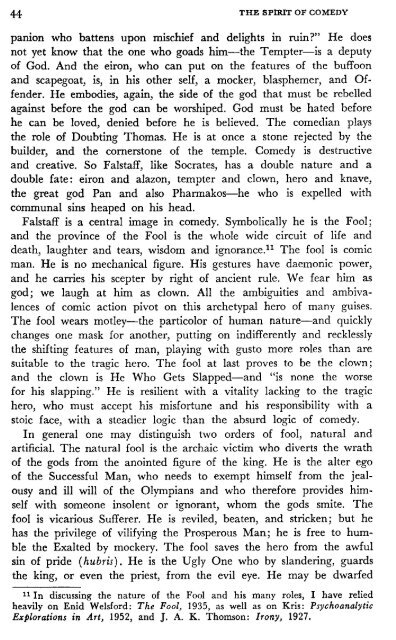The Meanings of Comedy* - Shakespeare Navigators
The Meanings of Comedy* - Shakespeare Navigators
The Meanings of Comedy* - Shakespeare Navigators
You also want an ePaper? Increase the reach of your titles
YUMPU automatically turns print PDFs into web optimized ePapers that Google loves.
4+ TIIE SPIRIT OF COMEDY<br />
panion who battens upon mischief and delights in min" He does<br />
not yet know that the one who goads him-the Tempter-is a deputy<br />
<strong>of</strong> God. And the eiron, who can put on the features <strong>of</strong> the buffoon<br />
and scapegoat, is, in his other self, a mocker, blasphemer, and Offender.<br />
He embodies, again, tlle side <strong>of</strong> the god that must be rebelled<br />
against before the god can be worshiped. God must be hated before<br />
he can be loved, denied before he is believed. <strong>The</strong> comedian plays<br />
the role <strong>of</strong> Doubting Thomas. He is at once a stone rejected by the<br />
builder, and the cornerstone <strong>of</strong> the temple. Comedy is destructive<br />
and creative. So Falstafl like Socrates, has a double nature and a<br />
double fate: eiron and alazon, tempter and clown, hero and knave,<br />
the great god Pan and also Pharmakos-he who is expelled with<br />
communal sins heaped on his head.<br />
Falstaff is a central image in comedy. Symbolically he is the Fool;<br />
and the province <strong>of</strong> the Fool is the whole wide circuit <strong>of</strong> life and<br />
death, laughter and tears, wisdom and ignorance.ll <strong>The</strong> fool is comic<br />
man. He is no mechanical figure. His gestures have daemonic power,<br />
and he carries his scepter by right <strong>of</strong> ancient rule. We fear him as<br />
god; we laugh at him as clown. All the ambiguities and ambivalences<br />
<strong>of</strong> comic action pivot on this archetypal hero <strong>of</strong> many guises.<br />
<strong>The</strong> fool wears motley-the particolor <strong>of</strong> human nature-and quickly<br />
changes one mask for another, putting on indifferently and recklessly<br />
the shifting features <strong>of</strong> man, playing with gusto more roles than are<br />
suitable to the tragic hero. <strong>The</strong> fool at last proves to be the clown;<br />
and the clown is He Who Gets Slapped-and "is none the worse<br />
for his slapping." He is resilient with a vitality lacking to the tragic<br />
hero, who must accept his misfortune and his responsibility with a<br />
stoic face, with a steadier logic than the absurd logic <strong>of</strong> comedy.<br />
In general one may distinguish two orders <strong>of</strong> fool, natural and<br />
artificial. <strong>The</strong> natural fool is the archaic victim who diverts the wrath<br />
<strong>of</strong> the gods from the anointed figure <strong>of</strong> the king. He is the alter ego<br />
<strong>of</strong> the Successful Man, who needs to exempt himself from the jealousy<br />
and ill will <strong>of</strong> the Olympians and who therefore provides himself<br />
with someone insolent or ignorant, whom the gods smite. <strong>The</strong><br />
fool is vicarious Sufferer. He is reviled, beaten, and stricken; but he<br />
has the privilege <strong>of</strong> vilifying the Prosperous Man; he is free to humble<br />
the Exalted by mockery. <strong>The</strong> fool saves the hero from the awful<br />
sin <strong>of</strong> pride (hubris). He is the Ugly One who by slandering, guards<br />
the king or even the priest, from the evil eye. He may be dwarfed<br />
11 In discussing the nature <strong>of</strong> the Fool and his many roles, I have relied<br />
heavily on Enid Welsford: <strong>The</strong> FooI, 1935, as well as on Kris: Psychoanalytic<br />
Etplorations in Art, 1952, and J. A. K. Thomson: Irony, 1927,


